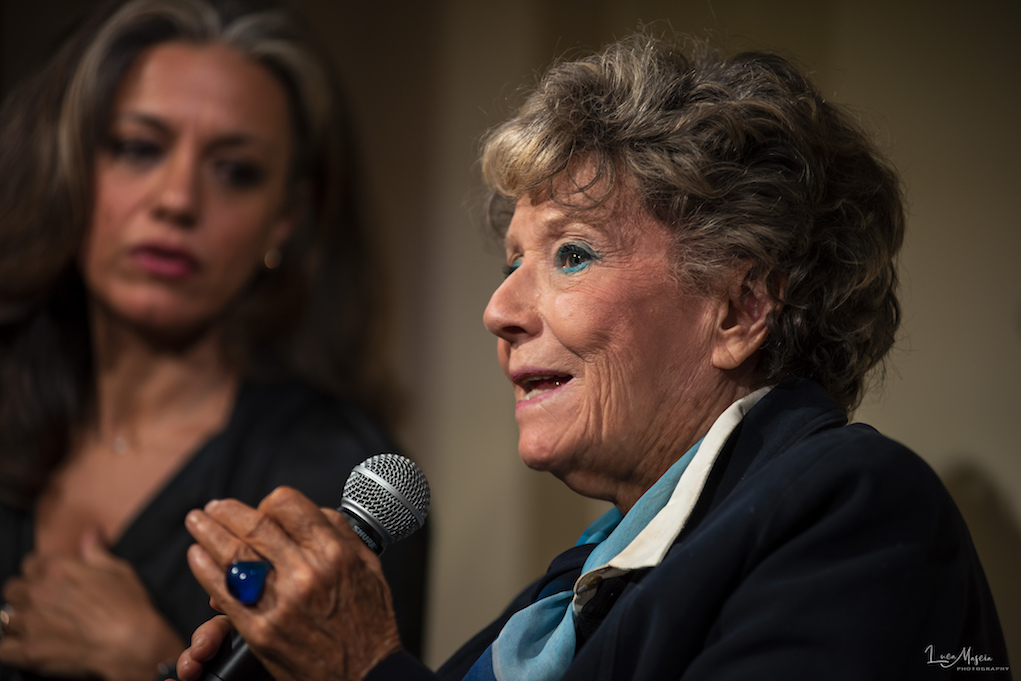
Last Monday was a strange day in New York. The evening before, the mayor announced that schools and universities would be closed because of the snow that was anticipated. In fact, the snow never arrived and the sky remained blue, though lashed by gusts of wind that made the temperature feel well below zero. I was very worried because that same night, at NYU Casa Italiana Zerilli-Marimò, we had planned to have a screening of the film Haiku on a Plum Tree followed by a conversation with the director, Mujah Maraini Melehi, and Dacia Maraini, celebrated and beloved as a writer even in the USA. Despite the (mistaken) weather projections and the (real) terrible cold, a small crowd showed up that evening that overflowed our auditorium and the adjacent screening room.
The film recounted a true story—an extremely true one about love, dignity, and resistance. But it’s an oversimplification to define it as a documentary because, beyond the interviews, the director uses animation and even some very elegant puppets, so that the final result is an almost poetic and personal version of the story. It begins almost like a fairytale: a young and beautiful Sicilian artist-princess, Topazia Alliata, is courted by a young Florentine explorer riding on a motorcycle, handsome as a Greek god and dressed in white, who crosses half the peninsula to ask for his beloved’s hand in marriage.
The young man isn’t only handsome; he is also a brilliant and adventurous scholar, among the pioneers of Italian anthropology, as well as a talented photographer, and intrepid mountain climber. His name is Fosco Maraini, and shortly after he marries Topazia, in 1938, he wins a scholarship to study the Ainu tribe in the north of Japan, taking with him his wife and daughter, Dacia, who is only two years old.

They are happy years for the young family. Soon, two more babies arrive—Toni and Yuki—who grow up speaking Japanese with their little friends and Italian at home with their parents. But they are also terrible years for millions of people all over the world. The conflict is truly global at this point, and in 1941, Japan suddenly enters the war by attacking Pearl Harbor, the American naval base. The Marainis apprehensively follow the news from Europe, even though there isn’t much of it and it is filtered through the pro-fascist regime of the Japanese empire. Mussolini is now a plaything in Hitler’s hands with the fall of fascism and the establishment of the German puppet Republic of Salò. The Japanese government, worried that enemies of Il Duce and potential spies may be inside that small Italian community, requests that everyone swear an oath of loyalty to the fascist Republic. It is a dramatic moment for the Maraini, because the police officers force each of them to make their choice separately. The two spouses know that there will be serious repercussions if they refuse to sign their loyalty to the regime, and are also sure that their choices, in the end, will inevitably involve their children.
Nevertheless, with extraordinary dignity and courage, they refuse to put their names down. Dacia, the daughter, told us at the Casa Italiana meeting that her parents’ refusal to cooperate wasn’t politically motivated. It was obvious that neither of them professed fascist sympathies, but their refusal was ultimately motivated by the most absolute and complete revulsion towards racism in any form. And fascism itself in those years arose from the legal discrimination against Jews, beginning with deportation and ending in extermination. While in Italy almost all university professors signed the abominable race manifesto, Fosco preached about the absolute lack of scientific basis of the concept of race itself.

The two years that followed were terrible. Around twenty Italians–including the three Maraini children–suffered hunger, psychological torture, and every sort of humiliation by the sadistic guards in the concentration camp. Topazia maintained a diary until her pencil was worn down to a stub. This diary was recently published together with a long introduction and an interview by her daughter Toni Maraini (Sellerio, 2003). Topazia’s voice accompanies us throughout the film and follows, in some respects, her niece Mujah’s trip in Japan, in search of the places where this painful imprisonment took place.
Mujah is visibly disappointed when she realizes that the memory of the events that devastated and molded her family has been completely erased. Seeing three Japanese girls in the courtyard of the public housing that was built where the camp formerly stood, she seems to recognize something reminiscent of her mother and her aunts as children. And this is another great quality of Mujah Maraini Melehi’s film: the absolute lack of resentment towards Japan, the Japanese, and their culture.
But the most enduring lesson that can be derived from the story of the princess and the explorer is that, like Topazia Alliata and Fosco Maraini, who rejected racism at the cost of hunger and imprisonment for themselves and their daughters, sometimes you have to choose to live free and according to your moral principles instead of “happily ever after”.
Translated by Emma Bass












